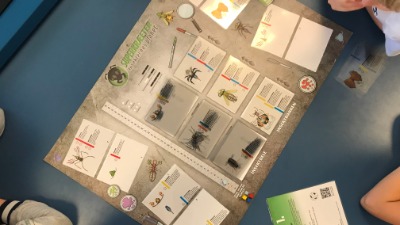Superpowers - planet of the insects (innovation and technology combined with natural science)
- Denmark,Copenhagen area
- 2019

| Time frame | |
| Categories | |
| Level of Schools | |
| External Partners | |
| Type of Schools | |
| URL | |
| Number of Schools involved | |
| Number of Schoolheads involved | |
| Number of Teachers involved | |
| Number of Students involved | |
| Number of Parents involved | |
| Number of External Partners involved |
The project “Superpowers - planet of the insects“ is introducing entry level innovation and technology, pedagogy and didactics in a natural science context. The aim is to let the pupils go through a four phased innovation process. This process is based on new knowledge and very concrete examples attained from different learning activities about insects. This is supported furthermore when the pupils are going to prototype their ideas (inventions or fantasy hybrid insects with new traits) on 3D printers and later on present these to each other.
The aim is to introduce entry level innovation and technology pedagogy and didactics in a natural science context. The aim is to let the pupils go through a four phased innovation process. This process is based on new knowledge and very concrete examples attained from different learning activities about insects.
The collaboration is divided in to four school days:
Day 0 - no pupils) Teacher training course conducted by the Children's University and The TekX fablab in collaboration, on the upcoming innovation-project. 5 hours of walk through activities and discussions on how to work together around the pupils´ learning processes
Day 1) on the school: visit from the local Children's University (Cirkus Naturligvis) that conducts an investigative day with focus on insects and their super powers (the material can be accessed at www. superkræfter.ku.dk) - The pupils play boardgames, build their own insect models of wings and moving parts and finally test their own bodies powers up against the insects. They also observe and study living insects (e.g. ants and cockroaches).
Day 2) the pupils visit the local FabLab TekX - where their own T&I teachers lead them through an idea generation process and development of new insect prototypes that will be printed in the 3D printers and brought home.
Day 3) presentation of the prototypes and the arguments for the design and what the idea is supposed to be able to do.
The practice is cofounded between Rødovre Municipality’s School Department and the University of Copenhagen.
The pupils really love the physical oriented hands on and easy approachable activities. They aspire to fruitful idea generation processes and set the scene for entry level innovation processes.
The close collaboration between the technology and Innovation educated schoolteachers (T&I teachers) and the external science student communicators from University of Copenhagen works very well, since the different competencies supplement each other nicely in order to support the pupil’s innovation and prototyping process. The programme is going in to the second season and has been through an iteration process that has emphasized the importance of spending more time prototyping. The 3D printing of inventions or fantasy hybrid insects with new traits has therefore been given more time and resources.
This is an inspiring practice because the construction of the collaboration between the schoolteachers, the Municipality driven fab lab (TekX) and the Children's University, gives so much space for synergy in order to contribute with professional knowledge and experience from the individual field of work. Together this creates a fantastic zone of learning and creativity for the pupils.
The didactical concept is based on inspiration from problem-based learning and working with 21st century skills and innovations processes in practice.
The innovation process that follows the investigation and learning phase on insects, follows a very strict facilitated process that aims at developing the pupils´ innovation competencies. This is supported furthermore when the pupils are going to prototype their ideas on 3D printers and later on present these to each other.
Boardgames, physical activities, constructing models of insect muscles and wings, drawing and 3D printing prototype inventions of insects.
The pupils need to agree on the decision making on which idea to develop on. Since they create a lot of ideas together, they also need to agree on which one to bring further together.
The ideas of the pupils are to be nurtured and challenged in order to make them even more thought through and qualified. The process is much more important than the product. The focus of this programme is the co-creation among the pupils, listening to each other and argumentation for 6 vs. 8 antenna or legs.
This activity is suitable for almost every pupil. The only variable is how many teacher resources needed for allocation in order to conduct the programme for pupils with special needs.
The practice works across natural science class and innovation and technology class. There is also a large element of scientific literacy and the Danish teachers could easily be involved.
There are elements of peer feedback and evaluation across the groups working with their own projects.
The quality has been outstanding, since everybody experiences a greater value of the programme in order to fulfil the aim on introducing technology and innovation in primary school. As mentioned earlier, the complementation of competencies and knowledge between teachers, TeKX and the Children’s University, really works well in order to make it a fun and engaging learning process for the pupils.
The external partner provides the practical learning input of insects as inspiration to new inventions and creation of technology. The field of biomimetics is reduced in complexity. Hence, it fits the ten year old pupils from 4th grade.
